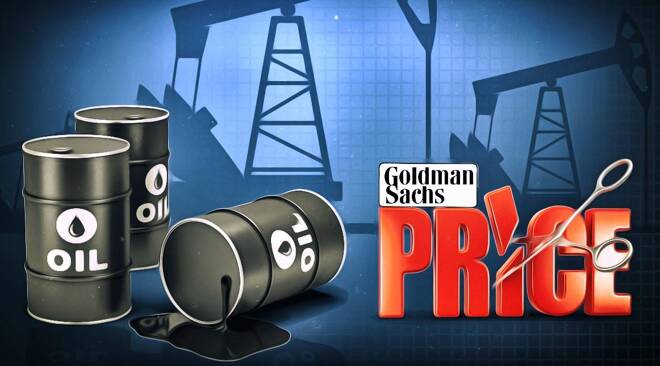Advertisement
Advertisement
Goldman Sachs Drops Oil Forecast To $40.00
By:
The strength of the US dollar is weighing heavily on the commodities markets especially dollar denominated commodities such as Crude oil and Brent oil.
The strength of the US dollar is weighing heavily on the commodities markets especially dollar denominated commodities such as Crude oil and Brent oil. As the US dollar index touched a 12 year high oil reversed weekly gains to tumble on Friday and continued to trade in the red as the new week begins. Crude oil is down 19 points in the morning session at 49.42 while Brent oil fell 46 cents to 59.36.
OPEC oil fell towards $59 a barrel on Monday as upbeat jobs data pushed the dollar higher, outweighing geopolitical tensions and the threat of output cuts in Libya and Iraq. That came as Goldman Sachs on Sunday forecast oil prices would reverse recent gains on the back of rising inventories, with U.S. crude expected to drop to around $40 a barrel.
Reuters released a statement from Goldman Sachs stating that “As a result and absent further unexpected OPEC disruptions, we expect Brent oil prices and time spreads to reverse their recent strength, although the lack of a meaningful build in the past few months leaves risk to our forecast for (WTI) oil prices remaining at $40/barrel for two quarters skewed to the upside,”
Data shows that for the past eight weeks, the United States has been producing and importing an average of 1.1 million more barrels of oil every day than it is consuming. That extra crude is flowing into storage tanks, especially at the country’s main trading hub in Cushing, Okla., pushing U.S. supplies to their highest point in at least 80 years, according to the Energy Department. If this keeps up, storage tanks could approach their operational limits, known in the industry as “tank tops,” by mid-April and send the price of crude — and probably gasoline, too — plummeting. The supply growth may even be speeding up. U.S. crude supplies rose 10.3 million barrels last week, the government said last week the largest weekly increase since October 2002.
Geopolitical issues in North Africa and the Middle East are all playing second fiddle to the U.S. dollar. News reports are saying that 10 foreign workers are missing in the latest attack on Libya’s oil fields by Islamist militants and there is a possibility they have been taken hostage, Czech and Libyan officials said on Saturday.
Saudi Arabia’s oil minister Ali al-Naimi denied last week that OPEC nations were at war with US shale producers, saying they welcomed them to the market. Mr el-Badri echoed those remarks, but noted that US shale was costly to produce. Saudi oil, by contrast, is cheaper to pull out of the ground. Members of the Organization of the Petroleum Exporting Countries should not cut output to “subsidize” higher-cost shale, OPEC Secretary-General Abdullah al-Badri said on Sunday. OPEC’s top official has said that the cartel’s decision to keep pumping crude in the face of collapsing prices was hurting the US shale oil industry and that a global pullback on investment could lead to a shortage that will push the market upward again. Statements from OPEC’s leaders have been closely watched since November, when the petroleum cartel decided to keep pumping oil at the same level rather than cut production to spur prices upward. Its next meeting is in June in Vienna.
About the Author
Barry Normanauthor
Advertisement
